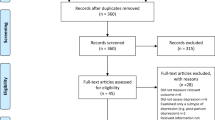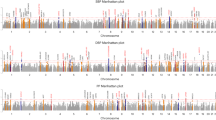Abstract
Lithium is the most effective mood-stabilizing drug in the therapy of bipolar affective disorder (BP). It is thought to exert its effect via the phosphatidylinositol signalling system. Myo-inositol monophosphatase 2 (IMPA2) codes for an enzyme in this system that is inhibited by lithium. It is located on 18p11.2, a region implicated as a BP susceptibility locus. We examined eight single-nucleotide polymorphisms (SNPs) identified within this gene for association with BP, using 237 parents–offspring trios and in 174 cases and 170 controls. No SNP showed association with BP. When good responders to lithium treatment were compared with the poor responders, some statistically significant differences emerged for two SNPs; however, the sample became too small to draw definitive conclusions. We cannot find support for the involvement of variation in IMPA2 in susceptibility to bipolar disorder, but the role of this and other genes from the phosphoinositol signalling pathway in predicting response to lithium treatment merits further investigation.
This is a preview of subscription content, access via your institution
Access options
Subscribe to this journal
Receive 6 print issues and online access
$259.00 per year
only $43.17 per issue
Buy this article
- Purchase on Springer Link
- Instant access to full article PDF
Prices may be subject to local taxes which are calculated during checkout

Similar content being viewed by others
References
McGuffin P, Owen MJ, O'Donovan MC, Thapar A, Gottesman II . Affective disorders (Chapter 6). Seminars in Psychiatric Genetics. Royal College of Psychaitrists: London 1994.
Goodwin FK, Jamison KR . Manic-Depressive Illness. Oxford University Press: New York 1990.
Manji HK, Potter WZ, Lenox RH . Signal transduction pathways. Arch Gen Psychiatry 1995; 52: 531–543.
El-Mallakh RS . Lithium. Actions and Mechanisms. American Psychiatric Press: Washington, DC, London 1996.
Lenox RH, Mc Namara RK, Papke, Mangi HK . Neurobiology of lithium: an update. J Clin Psychiatry 1998; 59: 37–47.
Berridge MJ, Downes CP, Hanley MR . Neural and developmental action of lithium: a unifying hypothesis. Cell 1989; 59: 411–419.
Atack JR . Inositol monophosphatase, the putative therapeutic target for lithium. Brain Res Rev 1996; 22: 183–190.
Steen VM, Lovlie R, Osher Y, Belmaker RH, Berle JO, Gulbrandsen AK . The polymorphic inositol polyphosphate 1-phosphatase gene as a candidate for pharmacogenetic prediction of lithium-responsive manic-depressive illness. Pharmacogenetics 1998; 8: 259–268.
Piccardi MP, Ardau R, Chillotti C, Deleuze JF, Mallet J, Meloni R et al. Manic-depressive illness: an association study with the inositol polyphosphate 1-phosphatase and serotonin transporter genes. Psychiatr Genet 2002; 12: 23–27.
Yoshikawa T, Turner G, Esterling LE, Sanders AR, Detera-Wadleigh SD . A novel human myo-inositol monophosphatase gene, IMP.18p maps to a susceptibility region for bipolar disorder. Mol Psychiatry 1997; 2: 393–397.
Sjoholt G, Gulbrandsen AK, Lovlie R, Molven A, Steen AM . A human myo-inositol monophosphatase gene (IMPA2) localized in a putative susceptibility region for bipolar disorder on chromosome 18p11.2: genomic structure and polymorphism screening in manic-depressive patients. Mol Psychiatry 2000; 5: 172–180.
Yoshikawa T, Padigaru M, Karkera JD, Sharma M, Berrettini WH, Esterling LE et al. Genomic structure and novel variants of myo-inositol monophosphatase 2 (IMPA2). Mol Psychiatry 2000; 5: 165–171.
Sjoholt G, Molven A, Lovlie R, Wilcox A, Sikela JM, Steen VM . Genomic structure and chromosomal location of a human myo-inositol monophosphatase gene (IMPA). Genomics 1997; 45: 113–122.
Berrettini WH, Ferraro TN, Goldin LR, Weeks DE, Detera-Wadleigh S, Nurnberger JI et al. Chromosome 18 DNA markers and manic-depressive illness: evidence for a susceptibility gene. Proc Natl Acad Sci USA 1994; 91: 5918–5921.
Stine OC, Xu J, Koskela R, McMahon FJ, Gschwend M, Friddle C et al. Evidence for linkage of bipolar disorder to chromosome 18 with a parent-of-origin effect. Am J Hum Genet 1995; 57: 1384–1394.
Yoshikawa T, Kikuchi M, Saito K, Watamabe A, Yamada K, Shibuya H et al. Evidence for association of myo-inositol monophosphatase 2 (IMPA2) gene with schizophrenia in Japanese samples. Mol Psychiatry 2000; 6: 202–210.
Sjoholt G, Ebstein RP, Lie RT, Berle J, Mallet J, Deleuze JF et al. Examination of IMPA1 and IMPA2 genes in manic-depressive patients: association between IMPA2 promoter polymorphisms and bipolar disorder. Mol Psychiatry 2004; 9: 621–629.
The International HapMap Consortium. The International HapMap Project. Nature 2003; 426: 789–796.
Georgieva L, Nikolov I, Poriazova N, Jones G, Toncheva D, Kirov G et al. Genetic variation in the seven-pass transmembrane cadherin CELSR1: lack of association with schizophrenia. Psychiatr Genet 2003; 13: 103–106.
Wing JK, Babor T, Brugha J, Cooper JE, Giel R, Jablenski A et al. Schedules for clinical assessment in neuropsychiatry. Arch Gen Psychiat 1990; 47: 137–144.
American Psychiatric Association. Diagnostic and Statistical Manual of Mental Disorders, 4th edn. American Psychiatric Press: Washington, DC 1994.
Kirov G, Georgieva L, Williams N, Nikolov I, Norton N, Toncheva D et al. Variation in the protocadherin gamma A gene cluster. Genomics 2003; 82: 433–440.
Myakishev MV, Khripin Y, Hu S, Hamer DH . High-throughput SNP genotyping by allele-specific PCR with universal energy-transfer-labeled primers. Genome Res 2001; 11: 163–169.
Hawskins JR, Khripin Y, Valdes AM, Weaver TA . Miniaturized sealed-tubes allele-specific PCR. Hum Mutat 2002; 19: 543–553.
Spielman RS, McGinnis RE, Ewens WJ . Transmission test for linkage disequilibrium: the insulin gene region and insulin-dependent diabetes mellitus (IDDM). Am J Hum Genet 1993; 52: 506–516.
Camp NJ . Genomewide transmission/disequilibrium testing—consideration of the genotypic relative risks at disease loci. Am J Hum Genet 1997; 61: 1424–1430.
Lewontin RC . The interaction of selection and linkage. I. General considerations; heterotic models. Genetics 1964; 49: 49–67.
Pritchard JK, Przeworski M . Linkage disequilibrium in humans: models and data. Am J Hum Genet 2001; 69: 1–14.
Acknowledgements
We thank all the patients and their parents who took part in the study.
Author information
Authors and Affiliations
Corresponding author
Rights and permissions
About this article
Cite this article
Dimitrova, A., Milanova, V., Krastev, S. et al. Association study of myo-inositol monophosphatase 2 (IMPA2) polymorphisms with bipolar affective disorder and response to lithium treatment. Pharmacogenomics J 5, 35–41 (2005). https://doi.org/10.1038/sj.tpj.6500273
Received:
Revised:
Accepted:
Published:
Issue Date:
DOI: https://doi.org/10.1038/sj.tpj.6500273
Keywords
This article is cited by
-
The Role of Pharmacogenomics in Bipolar Disorder: Moving Towards Precision Medicine
Molecular Diagnosis & Therapy (2018)
-
Genetic Influences on Response to Mood Stabilizers in Bipolar Disorder
CNS Drugs (2013)
-
The genetics of bipolar disorder: genome ‘hot regions,’ genes, new potential candidates and future directions
Molecular Psychiatry (2008)
-
A Promoter Haplotype of the Inositol Monophosphatase 2 Gene (IMPA2) at 18p11.2 Confers a Possible Risk for Bipolar Disorder by Enhancing Transcription
Neuropsychopharmacology (2007)



